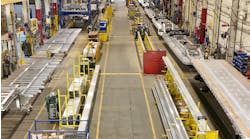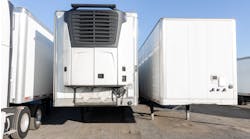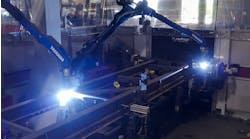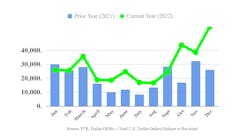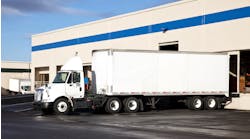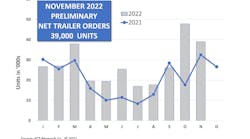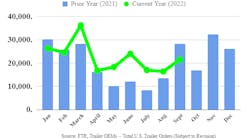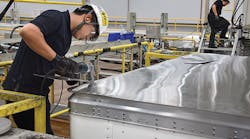Truck-Trailer manufacturers had a good year in 2017. It was not a banner year, but a good, solid year, not much different from 2016, but slightly better. However, it was 24,000 trailers below the build in 2015.
The Top-25 (plus 3) trailer builders produced 315,427 trailers in 2017. That is slightly more than the 313,607 trailers the same group built in 2016. (Actually, it is 1,820 trailers more than in 2016, or six-tenths of one percent more.)
The biggest change came at the top of the list. The largest builder of truck-trailers in North America was the second largest the year before. Hyundai Translead, headquartered in San Diego, California, built 10,000 more trailers than in 2016. Hyundai’s two manufacturing plants in Tijuana and Rosarito, Mexico, built 60,329 trailers in 2017.
Other trailer builders also benefited from the long-running trailer cycle and economic boom. Of the trailer manufacturers that reported their build numbers, 16 reported increased numbers of trailers built and 11 reported decreased numbers,
Other, smaller changes included much-needed increases in building of platform trailers and tank trailers, as the construction industry and oil fields rebounded.
The trailer totals reported here cannot be compared directly with other domestic surveys that do not also include Canadian and Mexican assembly plants. This survey does not attempt to report on the many small manufacturing plants located throughout North America, so the total trailer build is somewhat different than the Top-25 numbers shown here.
This Trailer/Body Builders survey is made by telephoning a member of the management team at each manufacturing company. The ranking of the companies does not necessarily reflect their relative success in terms of profitability or revenue received, but only the number of trailers produced. The dollar value of a trailer can vary greatly depending on the design, type of construction, materials used, and quality level.
Here is how the individual trailer manufacturers reported their trailer production in 2017:
(Downloadable printout of Top-25 Trailer Output Figures available at end of this article.)
Hyundai Translead
Hyundai Translead built 60,329 truck-trailers in 2017, a 19 percent increase over 2016 production. The vast majority of these were dry freight van trailers totaling 55,192 trailers, a 20 percent increase. Refrigerated trailer production was 2,553 reefers, a 13 percent increase.
Hyundai also built 2,514 container chassis in 2017, an increase of 19 percent from the preceding year, and 70 platform trailers, down 85 percent from 456 flatbeds in 2016. The company also built 786 converter dollies, which are not counted in the trailer total, but they do indicate that some of the trailer total is short doubles trailers.
More than half of the 55,705 dry freight van trailers were built in Hyundai’s new 548,000 sq-ft plant in Rosarito, Mexico, 40 minutes southwest of the main plant in Tijuana. Rosarito is on the coast 40 miles from Translead’s headquarters in San Diego, California. (See five page article published in the July 2017 issue of Trailer/Body Builders magazine).
(A preliminary total trailer count e-mailed to the Top-25 trailer manufacturers reported a 456 lower trailer build number, but Hyundai Translead corrected it on February 7 to the figures quoted here.)
Wabash National Corporation
Wabash National Corporation shipped 54,000 complete trailers in 2017, a nine percent decline from 2016. This includes 45,200 dry freight van trailers and 2,600 flatbed trailers, both down nine percent. Refrigerated van trailers took a bigger hit, down 19 percent on shipments of 3,500 reefers.
The turnaround in the petroleum industry was reflected in the tank trailer segment. Wabash shipped 2,250 tank trailers a seven percent increase over 2016 shipments. The company also built 1,050 converter dollies which are not counted in the full trailer numbers.
Wabash also reported shipments of 4,900 truck bodies, nine times as many truck bodies as Wabash shipped in 2016. These truck bodies are not counted as trailers in the Top-25 trailer total. The quickly developing “last mile delivery” emphasis among truckers involved in e-commerce shipments has brought about a new business segment at Wabash to report these truck bodies.
The company’s biggest segment is “commercial,” including van trailers, flatbeds and reefers. The second is “industrial” for the tank trailer brands acquired by Wabash. The new third segment is “last mile,” which will report shipments of the new Supreme truck body acquisition, as well as existing Wabash National truck body manufactured shipments.
“We are pleased overall with the company’s 2017 performance, as we established a stronger foundation for future growth and productivity,” said Dick Giromini, chief executive officer, at a January 31 press conference. “The addition of the Supreme truck body business was a key accomplishment, as it not only adds immediate revenue and profitability opportunity, but also provides diversification into a high-growth segment driven by the ever increasing adoption of e-commerce.”
Wabash’s new reporting segment called Final Mile Products will report results of the Supreme acquisition and the company’s existing truck body products. That Final Mile Segment reported net sales of $70,461,000 in the fourth quarter of 2017.
“In 2018 we expect to ship in the range of 56,000 to 60,000 trailer units, along with 22,000 to 24,000 truck body units, for a revenue projection of $2.05 billion to $2.15 billion,” said Giromini. “ We begin 2018 with a historically strong backlog of orders totaling $1.2 billion, an increase of 64% compared to the previous quarter.”
One year ago, Giromini had predicted that Wabash National would ship 51,000 to 55,000 trailers in 2017, a goal that the company accomplished.
Looking further into the future after the press conference, Giromini reported on some organic growth. “We have made significant progress in developing several new products, including the next generation of refrigerated van trailers and truck bodies, using molded structural composite (MSC) technology.
“While still in field evaluation mode, we are on track to produce our first 100 units by mid-2018, and now are on target to produce and sell our 200th refrigerated MSC van trailer by year-end. Expanded commercialization on a limited volume basis may come by January 2019.
“Delivering superior insulation of greater than 25%, plus 50% increase in floor load rating, this product is a true industry game changer for industry goods transportation. It will lead to significant growth opportunities for our refrigerated trailer and truck body businesses,” concluded Giromini.
Great Dane Limited Partnership
Great Dane Limited Partnership built 46,000 trailers in 2017, down four percent from 2016. The company also built 1,100 truck bodies not counted in the trailer total.
“Entering 2017, we expected a slowing in our industry, but as the year moved along, we saw increased orders from key customers and our distribution groups for both dedicated and stocking units,” says Chris Hammond IV, executive vice-president, sales.
“That trend has carried over into 2018, with extended backlogs and continued efforts to ramp up production where we can. We are optimistic about our core reefer customers despite industry projections for a slowdown in that sector.
“Dry vans will remain strong through 2018 as well. Flatbeds are a real bright spot, as that sector is really starting to show a more normal cycle after coming off two sluggish years. We expanded our truck body business in 2017 and are building a nice backlog in that segment.
“The year 2018 will be good all around for the trailer and truck body industry and their suppliers,” Hammond concluded.
Utility Trailer Manufacturing Co.
Utility Trailer Manufacturing Co. built 43,361 trailers in 2017, a six percent decline from the previous year. This includes 19,188 dry freight vans, an increase of a half percent above 2016. Refrigerated van trailer production was 22,282, down 12 percent. Flatbed and Tautliner production was up 12 percent at 1,891 flatbeds.
Considering the unusually strong trailer build and ordering at year-end, the outlook at Utility Trailer is positive. This trend has continued into the new year and backlogs are stretching out in all product categories.
“In 2018 we may top our 2016 production number, but probably not exceed the numbers of our record year of 2015,” says Craig Bennett, senior vice-president sales and marketing. In other words, the new year could see a 6 percent to 13 percent increase in trailer output at Utility Trailer.
“A strong economy and optimism are driving business decisions”, says Bennett. “Also, the new ELD (Electric Logging Device) requirements are reducing trucking efficiency by limiting driver hours. Fewer drivers mean more drop-and-pick operations, requiring more trailers.”
However, trailer production may be hampered by materials shortages and cost. Potential new duties on ingot could increase aluminum costs. Fabricated steel parts are also facing cost and supply questions. Even tires have been in tight supply.
Utility Trailer’s new Combo flatbed, the 4000AE, was introduced in 2017, and is making a statement, added Bennett. “With its aluminum crossmembers that are bolted to the steel main frame, it offers the weight of an aluminum trailer at the price of a combination steel-aluminum flatbed.”
Vanguard National Trailer Corporation
Vanguard National Trailer Corporation is reporting for the fifth year both the container chassis made by its parent company CIMC USA and the van trailers and reefers built by Vanguard National.
Vanguard produced 9,466 dry freight vans at its Monon, Indiana, headquarters plant and its new Trenton, Georgia, plant that was opened in July 2016. This build number is down 5 percent from the previous year.
Vanguard built 2,521 refrigerated trailers at its Monon plant and its reefer plant in Moreno Valley, California, down 10 percent from 2016. Combined refrigerated and dry freight van production was 11,987 trailers, down 11 percent from 2016.
CIMC Intermodal Equipment in Southgate, California, and Emporia, Virginia, produced 28,080 domestic and ISO container chassis, an increase of two percent above 2016.
The combined total of Vanguard National trailers and CIMC container chassis built in 2017 is 40,067 units, down two percent from 2016. This report was made by Charlie Mudd, president of Vanguard National Trailer Corp, from China where he was on a business trip.
Stoughton Trailers LLC of Stoughton, Wisconsin
Stoughton Trailers LLC of Stoughton, Wisconsin, built 15,600 trailers in 2017, down five percent from 2016. Of that total, 300 were container chassis and 15,300 were dry freight vans.
Stoughton also launched its new refrigerated trailer assembly line in Evansville, Wisconsin, during 2017. Although starting up at smaller build quantities, the refrigerated trailer line is capable of producing over 2,500 units per year.
“We are delighted with the test performance, acceptance and growing interest in our new refrigerated product,” says Bob Wahlin, president of Stoughton Trailers.”
Along with refrigerated trailers, dry vans and container chassis, Stoughton also continues to produce grain and livestock trailers.
“We expect to have another solid year in 2018 as trailer demand remains healthy,” adds Wahlin.
MANAC of St-Georges, Quebec
MANAC of St-Georges, Quebec, built 7,300 truck-trailers in 2017, about six percent less than the previous year.
Charles Dutil, president, had predicted a year ago that it would be a solid year, but a bit slower. And it was, but it “exceeded most expectations people had at the start of the year.”
Looking ahead, ‘We see gains in our vocational, flatbed and energy sectors.
We expect 2018 to be a solid year again.”
In addition to its main manufacturing operations in Quebec, MANAC builds platform trailers and bottom dumps in its two plants in Oran and Kennett, Missouri. Its newest acquisition, the former Peerless Ltd plant in British Columbia, produces forestry, logging and heavy-haul trailers.
Fontaine Trailer Company of Birmingham, Alabama
Fontaine Trailer Company of Birmingham, Alabama, built 5,844 trailers in 2017. This includes all platforms, both flatbeds and drop-deck, as well as heavy haul and military trailers. It is 77 percent above the 2016 output, but that year sales had suffered from excess dealer inventories carried over from the high production years of 2014 and 2015.
“Actually, 2017 was a little bit better than an average year for Fontaine,” says Hank Prochazka, president of the Fontaine Transportation Equipment Group. “We had some good military contracts, platforms were back up, construction and housing and all the segment markets were up except for automotive.
The 2018 year is starting very well, and I expect it will be a much better than average year.”
MAC Trailer Manufacturing of Alliance, Ohio
MAC Trailer Manufacturing of Alliance, Ohio, built 4,754 truck-trailers in 2017, a 13 percent increase, These included aluminum and steel dump trailers, aluminum refuse trailers, aluminum platform and drop-deck trailers, aluminum dry bulk pneumatic trailers, type 406 and 407 aluminum tank trailers, and stainless steel tank trailers.
MAC also manufactured 152 aluminum and steel truck bodies that are not counted in the trailer total.
Michael A. Conny, president of MAC Trailer Enterprises Inc, predicts another good year in 2018.
Strick Corporation
Strick Corporation built 4,500 trailers in 2017, an eight percent decline from 4,900 in 2016. This includes 2,100 dry freight vans built in the Monroe, Indiana, plant; 2,200 Cheetah container chassis from the Berwick, Pennsylvania plant; and 200 flatbeds and log trailers from the Evans plant in Sumter, South Carolina. Strick also built 60 converter dollies that are not counted in the trailer totals.
“It was another great year for us,” says Ben Katz, marketing manager. “Trailer unit totals were down a little due to the mix of higher hour trailers and chassis. So far, 2018 is shaping up to be just as strong as 2017. I would expect production numbers in 2018 to end up in the same ballpark as 2017.”
Pitts Enterprises in Pittsview, Alabama
Pitts Enterprises in Pittsview, Alabama, increased output by 26 percent, producing 4,400 truck-trailers in 2017. This includes Pitts’ new all-aluminum platform in both flatbed and drop-deck models introduced last year. Plant capacity was expanded into a new 40,000 sq. ft. building just for aluminum platforms.
The former Dorsey van plant in Elba is also doing well turning out increasing numbers of walking floor trailers. The Pitts plant in Pittsview also expanded by 25,000 sq ft to handle expected increases in demand for heavy-haul and forestry trailers.
Timpte Inc in David City, Nebraska
Timpte Inc in David City, Nebraska, built 3,225 grain trailers in 2017, a 17 percent increase over 2016.
“It was a respectable year, but the ag market is still soft,” says Dale Jones, president of Timpte. “We are optimistic that 2018 will be even better, especially the third and fourth quarters.”
That optimism is expressed with the opening of new sales and service branches. Timpte’ s new branch in Sioux Falls, South Dakota, had its first full year in 2017. Its eighth company store is now under construction in Indianapolis, Indiana.
Reitnouer Inc. in Birdsboro, Pennsylvania
Reitnouer Inc. in Birdsboro, Pennsylvania, built 3,048 trailers, down less than one percent from 2016. These are all bolted aluminum platforms and drop-deck platforms.
“Sales were a little slow in the first quarter of 2017, probably as a result of the election,” says Bud Reitnouer, president, “but then they picked up throughout the year and ended really strong. Robust sales now in the first weeks of the new year point to a better 2018, perhaps 15 percent better than 2017.
“The real challenge this year will be maintaining margin in the face of rising cost of materials,” reports Reitnouer. “With the volatility in commodities pricing, it is difficult to provide realistic quotes four to five months before build times. We had not raised our prices in the last three to four years, but we had to in 2017.”
East Manufacturing Company of Randolph, Ohio
East Manufacturing Company of Randolph, Ohio, built 2,885 trailers in 2017, a 16 percent increase. The biggest gains came in all-aluminum flatbeds, bouncing back 46 percent to 1,349 platforms. Aluminum refuse transfer trailers were also strong, increasing 50 percent to 377 trailers. Aluminum and steel dump trailers were down 21 percent at 1,029 dumps. East also built 130 dump bodies for truck mounting, but these are not counted in the trailer total.
East completed its expanded plant capacity in 2017, large enough to build 1,800 platform trailers annually,
David de Poincy, president, predicts East will build 20 percent more dump and refuse trailers and flatbeds in 2018. “My bold prediction is 3,500 trailers for East in 2018. That would be a company record.”
Heil Trailer International, headquartered in Athens, Tennessee
Heil Trailer International, headquartered in Athens, Tennessee, produced 2,800 trailers globally, an increase of a half percent over 2016. This includes both Heil and Kalyn Siebert.
“We were able to capture market share growth in 2017 with the launch of new innovative designs in the dry bulk and petroleum segments,” reports Ryan Rockafellow, VP sales and marketing. “Our new lightweight Fleet Duty Petroleum model maximizes payload for large fleets on the West Coast and others. We anticipate doubling sales of this model in 2018.”
Polar Tank Trailer of Holdingford, Minnesota
Polar Tank Trailer of Holdingford, Minnesota, built 2,200 tank trailers in 2017, a two percent increase over 2016.
“We are expecting a 10% to 20% growth in 2018 because of the oil patch coming back alive and a very strong general economy,” says Mark Hunsley, vice-president, sales and marketing. “Production might be the limiting factor of the number of trailers we will build and sell.”
Fruehauf de Mexico
Fruehauf de Mexico is reporting its production for the first time. The Fruehauf plant in the suburbs north of Mexico City built 2,128 truck-trailers, a ten percent increase over 2016 output of 1,941 trailers. The largest share of these are dry freight vans, but Fruehauf builds a full range of trailers including flatbeds and drop-deck platforms, curtain-siders, dump trailers, liquid tank trailers, dry bulk pneumatic hoppers and extendable container chassis.
Fruehauf de Mexico was the last Fruehauf plant operating in North America in 2014. It was acquired in 2015 by Alta Growth Capital private equity firm. Scott McDonough, chairman of the Fruehauf de Mexico board of directors, says this plant has been the dominant manufacturer of truck-trailers in Mexico for the last 50 years.
The plant has been in the same location but greatly expanded through those 50 years. Fruehauf International did a major upgrade in 1992, tripling plant size and getting it ready for NAFTA traffic and new size-weight restrictions.
Now a new management team headed by Carlos Porragas, chief executive officer, is upgrading the plant and product line to meet new North American standards. The new Fruehauf 53-ft composite dry van was the first to be redesigned, to be followed by the aluminum and steel platform line.
The Fruehauf de Mexico plant is located at Kilometer 28.5 on the Via Jose Lopez Portillo 131, Col. La Magdalena, Coacalco, Estado de Mexico, C.P. 557000.
Trail King Industries in Mitchell, South Dakota
Trail King Industries in Mitchell, South Dakota, had a flat year, building 2,100 truck-trailers, the same number as were built in 2016. However, their light-duty trailers, built with axle capacities under 10,000 pounds, grew by 17 percent to 700 units built in 2017. These are not counted in the heavy trailer total.
Order activity has increased in the new year, and the company is cautiously optimistic, predicting a ten percent increase in trailer output in 2018, according to Gene Astolfi, chief financial officer.
XPO Logistics Trailer Manufacturing in Searcy, Arkansas
XPO Logistics Trailer Manufacturing in Searcy, Arkansas, produced 1,836 trailers in 2017, a 30 percent increase over 2016. Only 300 of these were refurbished 28-ft doubles van trailers. The other 1,536 were new van trailers, of which 964 were short doubles trailers and 457 were 48- ft long. The other 115 were 53 or 57-ft long.
Plans for the coming year are to build almost as many total units, but almost all will be refurbished long and short trailers, says Paul Reed, XPO Manufacturing general manager.
Felling Trailers Inc in Saux Centre, Minnesota
Felling Trailers Inc in Saux Centre, Minnesota, built 1,524 truck-trailers in 2017, a seven percent increase, as predicted a year ago. The company also produced 4,434 light-duty trailers with axle capacities under 10,000 lb, an increase of 23 percent over the preceding year. Total unit count was 5,958 trailers, 18 percent above the 2016 combined total.
“We are expecting flat to modest growth (3% to 5%) in truck-trailer markets in 2018”, says Patrick Jennissen, VP-sales and marketing, “and slightly higher (5% to 8%) for light-duty trailers.
Kentucky Trailer of Louisville, Kentucky
Kentucky Trailer of Louisville, Kentucky, built 1,419 trailers in 2017, a six percent increase. Most of these are custom 53-ft van trailers with special tie-down equipment and underbody storage boxes for moving companies to haul furniture and household goods. Kentucky also built 478 truck van bodies for household goods moving companies and other local delivery companies.
Doepker Industries in Anaheim, Saskatchewan, Canada
Doepker Industries in Anaheim, Saskatchewan, Canada, built 1,300 trailers in 2017, an increase of eight percent over the preceding year. Doepker builds a wide range of dump trailers, oilfield equipment, forestry and agricultural trailers such as the Super B-train ag hauler.
Some of the 2017 increase resulted from Doepker’s acquisition in October 2016 of a manufacturer of heavy-haul trailers based in Alberta, Canada.
Premier Trailer Mfg. Inc, Visalia, California
Premier Trailer Mfg. Inc, Visalia, California, is a new entrant in the Top-25 ranks, having just approached the 1,000-trailer threshold. The company built 998 trailers in 2017, a 43-percent increase over 2016.
That big jump in sales reflects a growing trend among produce growers in California’s Central Valley toward tree nuts. Growers started planting more walnut, almond and pistachio trees eight years ago, and now those new plantings are coming into production.
Most of the Premier trailers are 22-ft long straight hoppers operated in the fields and on the highway as doubles connected by a 6-ft drawbar. The company also manufactures 24-ft. double flatbeds, light weight ag chassis, high axle produce trailers, and a round bale cotton trailer. The bottom dump ag trailers are designed to haul commodities such as corn, wheat, rice and fertilizer, as well as tree nuts.
Premier Trailer Mfg. Inc. was founded by Gene Cuelho, Jr, in 1996 after many years of working for his father’s company operating in the same trade. Jason Evett, operations manager at Premier Trailer Mfg, estimates 2018 production will be from 1,000 to 1,200 trailers.
Western Trailer in Boise, Idaho
Western Trailer in Boise, Idaho, built 994 trailers, a 22 percent decline. The continuing drought in the West is keeping all ag related businesses at a below-normal level. Western produces mainly platforms and bulk commodity trailers.
Order volume picked up in the last six months and remains strong into the new year. Todd Swanstrom, engineering manager, believes this sets the stage for solid gains in 2018.
Travis Body and Trailer of Houston
Travis Body and Trailer of Houston built 942 dump trailers in 2017, half a percent more than 2016.
“We had a great finish to 2017 with an increasing backlog and ramping up production as quickly as possible,” says Bud Hughes. “We are seeing a very bright outlook for 2018.
“With the current shape of the economy and passage of the new tax law, conditions should be very stimulative for business investment, and another great year for the industry—and Travis.”
Tremcar Inc. in Montreal, Canada
Tremcar Inc. in Montreal, Canada, built 827 tank trailers in 2017, an increase of three percent. It also built 199 body tanks for mounting on truck chassis, down 14 percent from 2016.
The company has two tank trailer plants in Canada, located in Toronto and Montreal, and one in the United States, located in Strasburg, Ohio. Its tank truck plant is in Malden, Massachusetts.
Talbert Manufacturing in Rensselaer, Indiana
Talbert Manufacturing in Rensselaer, Indiana, built 796 heavy-haul trailers, 30 fewer than in 2016, or four percent fewer.
“Quotes and orders remain very active in the new year,” says Troy Geisler, VP sales and marketing. “There is a lot of positivity in the markets we serve.”
Talbert is celebrating its 80th year in business in 2018, and the 70th anniversary of the removable gooseneck. The company was founded in 1938 as Talbert Construction Equipment Co. in Lyons, Illinois to serve the Chicago market.
Austin Talbert, engineer and founder, developed the first mechanical removable gooseneck, patented in 1947. He followed with the first hydraulic removable gooseneck 15 years later.
Towmaster Trailers in Litchfield, Minnesota
Towmaster Trailers in Litchfield, Minnesota, built 750 truck-trailers in 2017, which is down 29 percent from the previous year. Towmaster also built 2,450 light-duty trailers and 225 truck bodies, both of which are not counted in the truck-trailer total.
Towmaster has been increasing plant capacity during a three-year construction project, and now has added a night shift and second production line to boost output by 30%, according to Chris Pokornowski, trailer division sales manager.
For printout of Top-25 Trailer Output Figures, click on DOWNLOAD below.

